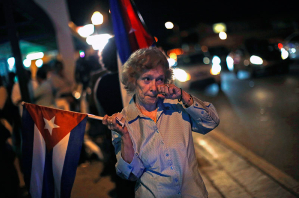
An American policy relic from the Cold War years took another step closer into the history books Wednesday after the United States and Cuba have decided to restore diplomatic ties that were severed more than 50 years ago.
Synchronizing their announcements on television, President Barack Obama and Raul Castro said that their countries would restart cooperation on a variety of issues, reestablish embassies in each country and ease some restrictions on commerce. The president said that these policy changes marked the beginning of a "new chapter" for the Americas.
"In the most significant changes in our policy in more than 50 years, we will end an outdated approach that, for decades, has failed to advance our interests, and instead we will begin to normalize relations between our two countries," Obama said in a speech at the White House.
According to Carol Lee, Jay Solomon and Jose De Cordoba of the Wall Street Journal, he urged Congress to bolster his executive actions by lifting the Cuba embargo.
"As these changes unfold, I look forward to engaging Congress in an honest and serious debate about lifting the embargo," Obama said. "Neither the American, nor Cuban people are well served by a rigid policy that is rooted in events that took place before most of us were born."
The Vatican and Canada helped facilitate the historic deal, according to Daniel Trotta and Steve Holland of Reuters. The landmark diplomatic steps were secretly negotiated after the U.S. and Cuba reached a deal to free American aid worker Alan Gross, who had been imprisoned in Cuba for five years.
Gross, who worked as a subcontractor for the U.S. Agency for International Development, or USAID, thanked Obama for all he had done to secure his release and did not blame the Cuban people for his ordeal. However, Reuters reported that his lawyer and family have described him as "mentally vanquished, gaunt, hobbling and missing five teeth."
"His case raised alarm about USAID's practice of hiring private citizens to carry out secretive assignments in hostile places," Trotta and Holland wrote. "Cuba considers USAID another instrument of continual U.S. harassment dating back to 1959."
The Wall Street Journal reported that a Cold War-era spy swap was made as well. The White House agreed to return three imprisoned Cuban agents in exchange for unnamed American intelligence operative who has languished in a Cuban jail for nearly two decades.
"The policy changes fall short of fully lifting the 54-year U.S. embargo against Cuba, which would require an act from Congress," Lee, Solomon and De Cordoba wrote. "But they forge significant economic ties between the two nations by allowing American financial institutions to open accounts with Cuban counterparts, easing restrictions on the export of U.S. agricultural and telecommunications gear to Cuba and permitting Americans to use credit and debit cards there."
The Wall Street Journal added that U.S. residents will be allowed to send up to $2,000 every three months to Cuban relatives on the Caribbean island, which would be four times the current limit.
While there will be easing of travel restrictions, the announcement doesn't mean that broad U.S. tourism in Cuba will take off anytime soon. According to the Wall Street Journal, Americans traveling to Cuba are only allowed to fall within 12 accepted categories as reasons to go over there and can bring home up to $400 worth of goods, which include a limited amount of the iconic Cuban cigars.
According to Reuters, both Cuba and the U.S. have been ideological foes after the 1959 revolution that brought Raul's brother, Fidel Castro, to power. Washington originally broke diplomatic relations in 1961 with Havana after the island nation, located 90 miles (140 km) south of Florida, decided to become a close ally of the now-defunct Soviet Union.







